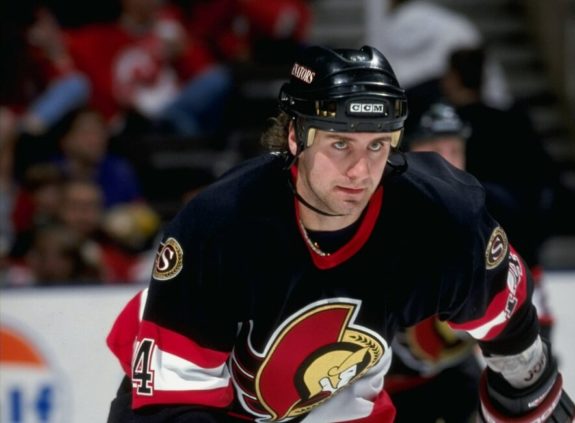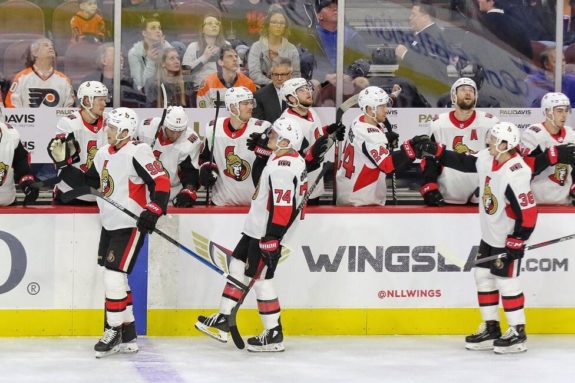After a brilliant win in their first game of the season, the Ottawa Senators looked more like they did last season against the Montreal Canadiens in their second, falling 4-1 and struggling to control the puck in their end. It was a frustrating loss and head coach Travis Green didn’t pull his punches about what went wrong. “We’ve got to be better with the puck,” he said following Sunday’s practice. “I think we’ve got to connect, make more connections with our passes to create more offence.”
That was certainly the case on Oct. 14, 2024, when the Senators hosted the Los Angeles Kings. Halfway through the first and on their first powerplay of the game, Kings’ forward Kevin Fiala put a quick shot past Anton Forsberg, followed by another goal from Trevor Lewis just over a minute later. Barely another minute later, Jake Sanderson scored his first of the season to put the Senators within one, which would hold until five minutes into the second period when Adrian Kempe gave Los Angeles the go-ahead goal.
Zack MacEwen and Alexis Laferriere would also score to keep the score status quo midway through the second, and with less than five minutes remaining in the period, Drake Batherson, Thomas Chabot, Fiala, and MacEwen again would even the score at five-all. The third period saw two more goals from each side, one each from Lafrerriere, Claude Giroux, Josh Norris, and Tanner Jeannot to force the game into overtime tied at seven, where Norris would emerge the hero to end the game at 8-7 for Ottawa.
In case you weren’t counting, that’s 15 goals scored between the two sides, making it one of the highest-scoring games in Senators’ history. However, it’s not the highest. Although they haven’t been in the league for all that long, they’ve put up some truly impressive score sheets. Here are the six highest-scoring games in Senators’ franchise history.
Oct. 30, 1992 – Senators 3, Sabres 12
When the Senators were granted an expansion franchise in 1990, it was seen as the biggest thing to happen to the city of Ottawa since it was named the capital of Canada in 1857. However, the team got off to a rough start; rookie general manager Mel Bridgman fumbled through the expansion draft, drafting three ineligible players due to a dead laptop. A win in their first game on Oct. 8, 1992, helped quash some of that embarrassment, but it quickly came back after the Senators failed to win the next 22 games, the worst of which happened just 10 games into the season against the Buffalo Sabres.
Related: Re-Doing the Ottawa Senators’ 1992 Expansion Draft
While the Sabres weren’t a powerhouse, they still had plenty of talent in Pat LaFontaine, Alexander Mogilny, Dale Hawerchuk, and Dominik Hasek, who were miles ahead of the Senators. By the end of the first period, the Sabres were already up 6-1. Ottawa found some life in the second, scoring two powerplay goals, but Buffalo fired back with another five before the Senators finally pulled goalie Steve Weeks and put in Peter Sidorkiewicz, who allowed another goal on six shots. It was arguably the worst loss in franchise history, as no team would ever score more against Ottawa, and it was just 10 games into their inaugural season.
March 4, 1993 – Senators 6, Kings 8
If there was a true moment of hope that the 1992-93 Senators weren’t as bad as their record suggested, it was on March 4, 1993. Despite this matchup being the 68th game of the season, Ottawa still hadn’t won on the road and was hungry to break their ever-lengthening winless streak. But with two wins and an overtime loss in their last four games, including a 6-4 victory over the Quebec Nordiques, there was never a better time for the Senators to do it than on their second stop on their four-game U.S. road trip to face the Kings.
Once again, the opposing team opened the scoring early, but this time, the Senators fired back less than a minute later with a goal from tough guy Mike Peluso. The Kings scored again a minute later, but the Senators got it back two minutes later, followed by another Kings goal and another Senators goal. The Kings pushed ahead to finish the first period with two goals from Jimmy Carson and Tony Granato, and Granato scored again to open the second period, but the Senators were still in this and answered back with a goal from former King Bob Kudelski.
On Nov. 25, 1992, Mike Peluso scored a pair of goals as the Ottawa Senators ended a 21-game winless streak (0-20-1) with a 3-1 win over the New Jersey Devils.
— 90sHockeyTweets (@Hockey90s) November 25, 2020
Photo credit: Getty Images pic.twitter.com/16PvunaLmg
Unfortunately, the Kings added another two goals to make it 8-4. Making up a four-goal difference would be a big task, but the Senators looked up for it after a power play goal from Norm MacIver and an early goal in the third period from Rob Murphy, his first of the season. However, Ottawa couldn’t find the back of the net over the next 14 minutes, leaving the score at 8-6.
Such was the Senators’ first season in the NHL – any glimmer of hope was quickly quashed. They eventually won a road game, beating the New York Islanders 5-3 on April 10 with just four games remaining in the season, but their 38-game losing streak on the road set an NHL record, as did their 40 road losses. The only consolation was that they didn’t set the record for the most losses; that honour went to the San Jose Sharks, whose 71 losses that season beat the hapless Senators by one. The Kings, on the other hand, went on to record 10 wins and three ties over the next 19 games to secure a playoff spot and make it to the Stanley Cup Final before falling to Patrick Roy and the Montreal Canadiens.
March 26, 1995 – Senators 4, Nordiques 11
The Senators loaded up on young talent the next couple of seasons, landing the 1993 first overall selection, which they used to select phenom Alexandre Daigle, and drafting the highly-touted Radek Bonk third overall in 1994. But it made little difference. By game 29 of the lockout-shortened 1994-95 season, they had just four wins and sat in last place. That didn’t bode well for their matchup against the Quebec Nordiques, a similarly young team that had nearly the same number of losses as Ottawa had won.

The game went about as well as expected. The Nordiques jumped out of the gate and scored four goals before the Senators could retaliate with a goal from Daigle, but Quebec kept coming. By the end of the second period, it was already 9-2, so the Nordiques seemingly took their foot off the gas in the third and only added two more while the Senators clawed back with their own two goals. Despite the futility, the game saw Daigle score his first career hat trick and his only one as a Senator, and tough guy Scott Levins scored his first goal of the season. It also saw Peter Forsberg’s first two-goal game of his career and Scott Young’s third career hat trick, but his first against someone other than the Sharks.
While Quebec surged to first place in the Eastern Conference, Ottawa won just five more games that season and once again landed the first overall pick, which was used to grab defenceman Bryan Berard, who demanded a trade after attending his first training camp the following season. The one silver lining for the Senators was that this season prompted several big changes. By 1996-97, only 10 players remained from the 1994-95 roster, half of whom were under 21 years old before the overhaul. That’s what it took to get the Senators finally into the playoffs. That, and the emergence of the 1996 Calder Trophy winner, Daniel Alfredsson.
Nov. 13, 2001 – Senators 11, Capitals 5
By 2001-02, the Senators were firmly established as an Eastern Conference powerhouse. They had some of the best young players in the NHL with Alfredsson, Martin Havlat, Marian Hossa, Wade Redden, and Zdeno Chara, and a great up-and-comer in Jason Spezza. They only lacked sustained success; in five playoff appearances, they never got past the second round despite two first-place division finishes. The Washington Capitals, on the other hand, were coming down after years of success. Their core was aging and, after back-to-back division titles, they limped to a 6-9-2 record to start the season.
The gap between the two was never more obvious than on Nov. 13, 2001. Ottawa was coming off a six-game win streak where they outscored their opponents 24-8, while Washington had just broken a six-game winless streak three days earlier. The Senators set the tone early, scoring two goals in the first five minutes and jumping out to a commanding 5-1 lead by the end of the first period. Capitals’ goalie Olaf Kolzig was yanked heading into the second and replaced with former Senator Craig Billington. It looked like Washington might stage a comeback after Sergei Gonchar scored a goal within the first three minutes. Still, Alfredsson retaliated less than 30 seconds later to keep the Senators up by four. He scored again to open the third with 25 seconds off the clock, and two more insurance markers left the game at an impressive 11-5.
Not only did Ottawa set a new win-streak record with seven wins, but they also set a franchise record for the most goals scored in a single game and were the first team to score 10 or more goals in a game since Feb. 3, 1999. Defenceman Karel Rachunek also set a personal best, scoring four points in the game, a total he’d never hit again. The Capitals were clearly out-gunned, but they made up for it with violence. Four fights occurred over the 60 minutes, with Chris Simon and Rob Zettler each partaking in two. However, Senators’ rookie Chris Neil made the strongest impression, going the distance with the heavyweight Simon. While the Senators’ streak ended the next game with a tie to the Carolina Hurricanes, Neil became an important part of the Senators’ character and leadership core for the next 15 years.
Nov. 2, 2005 – Senators 10, Sabres 4
More than a decade after the Sabres embarrassed them, the Senators got a shot at revenge on Nov. 2, 2005. Ottawa had remained a top team after the 2004-05 lockout, winning the first six games of the season and surging to an 8-2 start, but the Sabres weren’t that far behind them, cruising to a 7-4 record. But the Senators proved that they were the much better team that night. Havlat, who just returned from a five-game suspension, and newcomer Dany Heatley each scored twice in the first period, and Havlat completed his hat trick early in the second before the Sabres finally got their first. Buffalo had a brief comeback, scoring three goals before Havlat scored his fourth of the night, followed by four goals from Alfredsson to finish off the Sabres.
After such a dominant start to the season, the sky was the limit for the Senators. Both Havlat and Alfredsson set personal bests for the most goals in a game and joined Heatley and Hossa as the only other Senators to accomplish the feat. But, just as things were looking up, it all came crashing down. Havlat sustained a shoulder injury at the end of the month, keeping him off the ice until April, ending what could have been his best season offensively. Hasek, who joined the Senators in the offseason, was also injured in February and didn’t play another game for Ottawa. The Senators still finished first in the East and beat the Tampa Bay Lightning in the first round of the playoffs, but without some key players, they fell to the Sabres in Round 2, four games to one.
Dec. 29, 2007 – Senators 6, Capitals 8
It’s interesting how things come full circle. In 2007-08, the Senators were still a dominant force, but cracks were starting to show. Aside from Spezza, the team’s core was 27 years old or older and lacked some of the depth it had six years ago. After bottoming out in 2003-04, the Capitals were now one of the best up-and-coming teams in the NHL, led by Alex Ovechkin, Nicklas Backstrom, Alexander Semin, and Mike Green. Just like in 2001, the gap was evident on Dec. 29, 2007, with the Capitals getting out to an early 2-0 lead before Alfredsson scored to bring the game within one before the first period ended. The second period went much the same way; Washington scored two early goals before Alfredsson got the Senators back into it, but Backstrom scored in the dying seconds of the second to push the Capitals up 5-2.

Ottawa came out guns blazing in the third, scoring three goals in 13 minutes while Washington scored just once in the same span, and suddenly, a game that was slipping away was well within reach. Mike Fisher helped keep it that way, scoring his third goal of the game after Ovechkin scored his third. It was Fisher’s first and only hat trick of his career, but it was tarnished by Ovechkin, who scored his fourth on the empty net to ensure the Capitals’ 8-6 victory. Ottawa still finished the season with 43 wins, but it was the start of the team’s decline. They missed the playoffs in 2008-09 and 2010-11, leading to many changes over the years, including the departure of Alfredsson at the end of the 2012-13 season. Truly, an era had ended in Ottawa.
Feb. 18, 2019 – Senators 7, Blackhawks 8
The most recent barnburner took place back in 2018-19. After a miserable 2017-18, there was some hope after Brady Tkachuk surprisingly left Boston University to join the Senators. Along with the 22-year-olds Chabot and Colin White and a few other youngsters, there was hope that this season would lead to better things after trading away captain Erik Karlsson. Even though they finished last in their division, the team was in the running for a playoff spot until they were finally mathematically eliminated by the Boston Bruins on March 9, 2019.
But the game on Feb. 18, 2019, came to represent the struggle of the entire season. Before the first period was half over, the game was already at 3-2 for the Senators thanks to goals from Bobby Ryan, Rudolfs Balcers, and Mark Stone, but by the time the period ended, the Chicago Blackhawks had surged to a 5-4 lead and never relented. White tied the game within two minutes into the second, but the Blackhawks extended their lead to 7-5 by the end of the period, and another early goal in the third by Jonathan Toews put the game out of reach for Ottawa. Not even a two-goal effort from Chabot was enough to close the gap and the game ended 8-7.

It was one of the busiest games of the 2018-19 season; the only other contest that hit the 15-goal mark was when the Calgary Flames defeated the Columbus Blue Jackets 9-6 in December. Several Senators had notable performances, too. Tkachuk recorded his third three-point night of his career and his first three-assist game, which he also did against the Kings this season. Chabot’s two-goal night was also his third of his career and second of the season. Finally, en route to hitting a career-high 41 points, White recorded his first and only three-point night and his second two-goal effort. Unfortunately, he only scored twice in a game once more in his career on Feb. 25, 2021. As for the Senators, this season preceded their total collapse, leading to a major fire sale.
There are a lot of eerie similarities between Feb. 18, 2019, and Oct. 14, 2024. Not only were the final scores the same, but the losing team got out to an early lead, the first, third, and 13th goals were scored on the power play, and Tkachuk had a three-point effort in both contests. But, while the game in 2019 was the beginning of the end for the Senators and saw them struggle with futility, Monday’s game could be the end of that struggle. There are a lot of games left, but when a team can come from behind and steal a win against a projected playoff team, that’s always a good sign.
